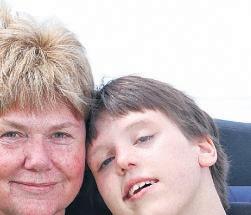
7 minute read
Epilepsy awareness is the answer, so ask the questions









Raising children is stressful at the best of times, add to that a diagnosis at eight weeks old and it raises more questions than anyone can answer at that point in time. ANNA MCGUINNESS spoke to one mother whose search for answers and support led her to become an epilepsy advocate
at HeR woRst,
Lockington teenager Kaitlyn Lewis was suff ering through 120 seizures a day, with no reprieve.
Not even her parents could tell when one stopped and the next one began.
Kaitlyn was born with a rare brain condition — agenesis of the corpus callosum — meaning the nerves that connect the two sides of the brain never formed, leaving her non-verbal and unable to walk.
Her mother Carolyn knew something wasn’t right before the doctors delivered the diagnosis at eight weeks old, she was having trouble feeding and Kaitlyn wasn’t putting on weight.
Carolyn’s fi rst reaction was shock.
What was this condition, and what did it mean for the rest of Kaitlyn’s life?
Now 16, Kaitlyn is epileptic — one of many aff ects of the agenesis.
She suff ers through seizures triggered by anything from tiredness to feeling unwell.
“Her fi rst seizure was when she was 12 months old, by the time she was three she was having 120 a day, we lived with it all that time,” Carolyn said.
Kaitlyn has intractable epilepsy which means the seizures cannot be controlled by medicine, however a particularly bad run led to doctors fi nding a way to make them less frequent.
“In 2009 we got a new neurologist after she’d been airlifted to hospital in Melbourne, she spent a week having seizures and they couldn’t stop them,” Carolyn said.
“The neurologist put her in an induced coma for three days to stop them and came up with a cocktail of epilepsy medications.
“Since then we’ll usually get three seizures a week, apart from the odd day where she might have a lot.”
Kaitlyn experiences generalised tonic-clonic seizures which don’t last long but can be continuous, the risk is she vomits when she comes out of a seizure, which can put fl uid on her lungs and becomes life-threatening.
The condition has had a profound impact not only on Kaitlyn but also her family, including her fi ve older brothers, something Carolyn is very aware of.
“My kids have missed out on so much, with school there’s been times when I haven’t been able to buy their school books for them because Kaitlyn’s been so unwell and we’ve had to go to hospital,” she said.
“They’ve been kept in at school because their readers haven’t been done or they didn’t have books, and even mentally, Kaitlyn was in ICU when my son had his VCE exams.
“My husband had to take time off work to look after the kids and sometimes we’d be in Melbourne for a month at a time.”
There were times when it would all be too much.
“The disability is not what causes us the most stress, it’s the red tape and the paperwork, that’s very hard when you’re juggling everything,” Carolyn said.
But one of the hardest things is finding support in extended family and friends.
“People are scared of caring for Kaitlyn, even family members, so you’ve got no back up that you usually would have, such as asking somebody to mind the kids so I could duck to the shop,” she said.
Carolyn believes this fear of minding Kaitlyn comes from a lack of understanding on what to do if she had a seizure, and with more than 250,000 Australians currently living with epilepsy she said people need to be more aware and understanding.
Some relief came from finding other families dealing with a similar situation.
“There’s a support group that run a conference every two years, there’s a lot more people out there than you realise,” Carolyn said.
“Because an MRI is the only way to detect it, some people are initially misdiagnosed with cerebral palsy.”
The condition affects people in different ways and each person has varied abilities.
Kaitlyn’s condition is one of the most severe, something Carolyn believes could have been helped through early intervention, but living regionally meant access to resources was limited.
“We struggled to get a physio and occupational therapist for years and years. In Melbourne they can access it weekly, out here we get once a term and we’ve had that disadvantage all along,” Carolyn said.
“We heard along the way that we ‘fell through the cracks’, when she was diagnosed. The hospital should have organised a physio and all that straight away, but we never received anything.
“We needed a speech pathologist and a physio but they kept sending us a psychologist.”
Thanks to her medications Kaitlyn can go to school at Echuca Specialist School every day, which she loves.
“All the kids at school are so good with her, the main word she can say is ‘hello’, she’s very social and well liked at school,” Carolyn said.
However, Carolyn finds Kaitlyn is sometimes excluded from excursions because of the risk of her having a seizure.
“I hope me raising awareness is going to make people more understanding, and we can give these kids a better life because they deserve inclusion like everyone else,” Carolyn said.
“People think the discrimination has stopped but it hasn’t, we still need to keep fighting because it’s still out there, these barriers stopping them, they should be able to participate like everybody else.”
Echuca Specialist School principal Paul Marshall said Kaitlyn attends outings however extended trips to Bendigo, Shepparton and Melbourne become tricky— and have the potential to be life-threatening for Kaitlyn.
“She needs to be fairly close to a hospital at all times due to the severity of her condition and while we would love for her to come on all our outings it’s not always possible due to those complications,” Mr Marshall said.
He said Kaitlyn helps at the Twin Rivers School café where she takes orders and delivers coffees.
“We do our very best to provide support for Kaitlyn to be included in activities wherever it’s possible,” he said.
A year ago, Carolyn began working for herself as a support worker, putting what she had learnt from caring for Kaitlyn into practice.
“I did it because I knew how people were missing out, not just on having a support worker, it’s missing out on having someone else caring,” Carolyn said.
“I treat my people how I want my daughter to be treated, I get people ringing all the time and I just can’t say no.”
Carolyn said due to a lack of funding through National Disability Services, the family is eligible for but hasn’t received funding for the fittings required to have a support worker in their home, leaving the job to Carolyn.
For parents of children experiencing a similar diagnosis, she believes surrounding yourself with people who understand and care is vital.
“It’s getting support, trying to talk to other families in the same situation because it’s very hard to find support and that’s what they’re lacking,” Carolyn said.
Carolyn is the guest speaker at the Purple Day event in Echuca on March 26, a day dedicated to raising awareness around epilepsy.
Your Locally Owned and Independent Family Friendly Dentist


When was the last time you had a dental check up?
Our range of services include: check-ups and cleans oral cancer screening x-rays and 3D imaging root canal therapy fi llings tooth whitening tooth removal dental implants nitrous oxide crowns, bridges and veneers dentures


Call for an appointment today on 5482 1217










